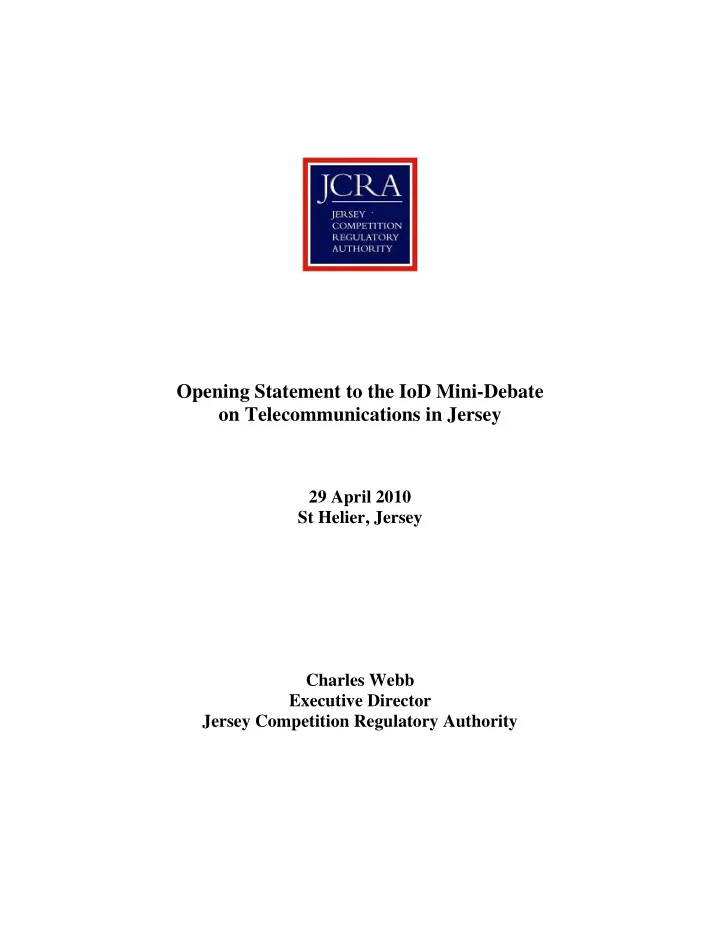

Opening Statement to the IoD Mini-Debate on Telecommunications in Jersey 29 April 2010 St Helier, Jersey Charles Webb Executive Director Jersey Competition Regulatory Authority
In 2002, the States of Jersey introduced a new framework for the provision of telecommunication services. Under the Telecommunications Law implemented that year, Jersey Telecom was incorporated and given the freedom to act in a more commercial manner. In addition, the JCRA became Jersey’s independent telecommunications regulator. This Law places a primary emphasis on the satisfaction of demand for telecommunication services, where appropriate by promoting competition. The framework introduced by the States in 2002 has resulted in the panel that sits before you this evening. This framework has facilitated the investment of tens of millions of pounds by the companies represented on this panel to enhance and maintain Jersey’s vital telecommunications infrastructure. These investments have led to unprecedented choice in the telecommunication services on offer in Jersey The big winners of this process have, of course, been consumers. Unprecedented choice in services on offer has resulted in substantial consumer savings. In September 2008 the JCRA estimated that increased competition in both mobile and fixed-line telecommunication services resulted in total consumer savings in Jersey of approximately £7 million. This estimate was calculated before the introduction of mobile number portability, which has resulted in even further price reductions and additional consumer savings. We have therefore come a long way since 2002. However, we still have a long way to go. While a level competitive playing field largely now exists in mobile telecommunications, substantial barriers to effective competition remain in the provision of fixed-line telecommunication services and broadband. The Regulaid Report published late last year characterised the problems in Jersey’s fixed-line markets as severe because there was no firm foundation for effective competition. 2
This impedes consumer choice and can make Jersey less attractive than its neighbours for further telecommunications investment. The implementation of the recommendations arising from the Regulaid Report form the central component of the JCRA’s 2010 Strategic Plan, which we are currently pursuing. However, the challenges that we face are not solely regulatory. If there is one constant about telecommunications – it is change, and increasingly rapid change. The provision of advanced telecommunication services is moving from the early digital 2G service of yesterday, to the more functional 3G service of today to the emerging broadband-based 4G service of the quickly approaching tomorrow, with ever-increasing data speeds and usage requirements. Clearly, in this environment, further telecommunications investment will be required if Jersey is to maintain its status as a world leader in the provision of financial services, and diversify its economy into new sectors such as eGaming. The need for further investment will create additional regulatory challenges, as it will be important for regulation to create the right conditions for further innovation and development. I would like to briefly discuss three broad points that should help the JCRA remain an effective regulator in this rapidly changing environment. First, we are currently working with our partners in Economic Development to implement legal changes that have been recommended to improve Jersey’s regulatory framework. These changes include a streamlined consultation process and the power to fine operators for licence violations. Second, the JCRA is increasingly looking at regulatory issues on a pan-Channel Islands basis. The successful implementation of MNP remains a hallmark of what can be achieved through regulatory cooperation between Jersey and Guernsey, to the 3
benefit of consumers in both islands. Currently, we are working together on the implementation of new wholesale access products, and we will continue to look for other areas where regulatory efficiencies can be achieved. In addition, we have an opportunity to both broaden and deepen our level of cooperation after Guernsey implements its own competition law. Third and finally, the JCRA will not hesitate to withdraw regulation and lower compliance burdens, when doing so is warranted by the facts. Just last week, the JCRA removed JT’s former designation of dominance in mobile telecommunication networks and services. The decision reflects our firm belief that regulation in a market can become more light-handed as the level of effective competition increases. So we have come a long way since 2002, but we still have a long way to go. I look forward to tonight’s debate. As a competition authority, the JCRA would never claim to a monopoly on good ideas! We therefore look forward to the constructive exchange of ideas tonight, which I’m sure will contribute to our mutual interest of effective telecommunications regulation in Jersey and the Channel Islands. Thank you. 4
Recommend
More recommend